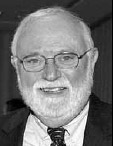
November 7, 2014
If you are Irish and Boston-bred, the annual Boston Irish Honors luncheon hosted by the BIR can truly be said to be a “feel-good” event in the annual autumn calendar.
The idea we had when the honors was first conceived was to search out and tell the stories of families and individuals whose lives can be described as exemplary – that is, sterling examples of what it means to have been brought up in Irish homes from among our common ancestral community.
The fundamental concept for the luncheon was suggested by Jim Carmody, the vice president and general manager of the Seaport Hotel, the venue for each year’s celebration. When we met in 2010 to organize a 20-year anniversary event for our newspaper, it was Jim who suggested that we not only seek out and recognize individuals who have gained success and celebrity in their chosen fields, but also add a focus on their roots – the Irish family common to us all, the source of our support and strengths, the mothers and fathers, aunts and uncles, grandparents and cousins – the folks we all share in common.
His suggestion brought an immediate recollection for me. While growing up in Dorchester, I regularly visited my grandmother Forry’s home a block away, and every Sunday after Mass, we would share a meal with her and my aunts. As I remember her, I can almost smell the aroma of those great biscuits she made! During a thunderstorm, Hannah Crotty Forry would bring out the holy water and sprinkle it around the house (one of my mother’s favorite expressions: “God between us and harm.”)
I got to know my cousins there, because they, too, would come over from Southie to visit Grandma every Sunday. And my three aunts who lived with her – Anna, Dora and Kate – they each divided up and took responsibility for their ten nieces and nephews, and they made sure we received an allowance each and every week.
It was surely a good reason to visit each week – that 25 cents I got from Aunt Dora went a long way back in the 1950s! But looking back on those family ties from this perspective, so many years later, makes me pause and realize how supportive they were to me and the others of my generation. In their own way, they looked after each of us: We were Boston, Irish, and Catholic, and we were nurtured in a manner that deserves to be recalled and celebrated.
It is also truly a culture that urgently needs to be passed forward, to the new generations of children who share our common ancestry.
I have always been fascinated to learn the stories of my family heritage, much of them essentially hidden from view by the simple passage of time. Forty years ago, I sat my parents down in front of a tape recorder and asked these two South Boston natives to tell me the story of how they met, It seems that my mother’s brother was a one term Southie state rep named Joe Toomey, and he left politics when his wife told him she didn’t care for all the people who were coming to the house looking for favors.
So my uncle turned to selling cars from the house, and it just so happened that my father, with a few dollars in his pocket from a good job on the Boston El, was looking to buy a car. So he came to the Toomey house on Broadway at the corner of G, and there he met my uncle’s young sister, herself still single and … Well, here am I, 90 something years later, telling a story that, had I not asked, I likely would never have known.
At last month’s Honors luncheon, John Burke related stories of the Burke family, of John and Ellie and their parents and siblings. There were 400 in the room, among them 53 Burke relatives, and it was a moment familiar to us all. John Burke gave a word of advice: “If your mother and dad are still alive, go home today and ask them to tell you their storieds.”
I would add, “Record it on your smart phone, or make a video of it—but do it now, while there is time.” In Phil Coulter’s mournful lyrics, “What’s lost is lost, and gone forever.”

